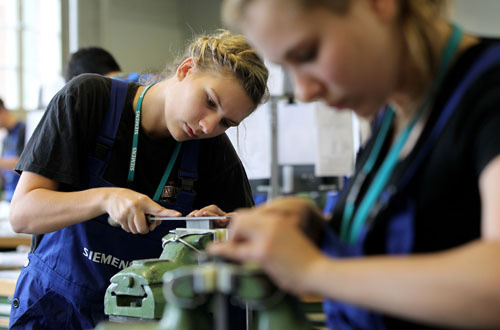A lack of female engineers is threatening the UK’s competitiveness, according to the National Centre for Universities and Business (NCUB), which is calling on schools, universities, business and Government to work together to increase the number of women in the profession.
Coinciding with Tomorrow’s Engineers Week (04-08 November 2013), NCUB has released data showing that the proportion of female engineering professionals in the UK has risen from 5.5% in 2012 to 6.3% in 2013. However, this trend is at risk given that the proportion of female A-level Physics students and Engineering undergraduates are both falling:
- Only 20.7% of 2013 A-level Physics students were female, down from 21.3% in 2012. This compares to 57.8% of Biology students and 39.3% of Maths students.
- Only 14.3% of the 2011/12 Engineering and Technology undergraduates were female, down from 14.5% in 2010/11. This compares to 57.6% of Medicine and Dentistry undergraduates and 17.4% of computer science undergraduates.
NCUB is working with schools and colleges to encourage girls to take Physics GCSEs and A-levels and subsequently consider pursuing a career in engineering or manufacturing as part of its Talent 2030 initiative. The campaign’s aims are that by 2030:
- 50% of GCSE Physics students are female (compared to 48.6% in 2013)
- 30% of A-level Physics students are female (compared to 20.7% in 2013)
- 30% of Engineering and Technology undergraduates are female (compared to 14.3% in 2013)

Dr David Docherty, CEO at NCUB commented: “Improving the proportion of female employees in the engineering industry is not only valuable from a diversity perspective, but is essential for economic growth. Britain’s long term economic success undoubtedly rests on having a world-class engineering and manufacturing sector. Unless more women embark upon engineering careers, the industry will continue to draw from a narrow talent pool and this threatens to affect the UK’s competitiveness and economic growth. We cannot be complacent; we must take action today.”
NCUB has suggested a number of recommendations to Government, business, schools, colleges and universities in order to achieve the campaign’s targets. These include:
- Businesses should make a commitment to support an engineering mentoring scheme particularly aimed at girls before they reach 14 years old;
- Schools and colleges should set targets for the number of girls achieving B grade or above for A-level Physics;
- The Government should include the number of girls passing A-level Physics at B grade or above in all school and college league tables;
- Universities should promote placement and internships for all Manufacturing and Engineering courses.
The campaign is also working to change the perception of engineering as a career. Dr David Docherty commented: “We know that many people, especially young women, have the wrong impression about the potential benefits of an engineering career. The industry needs to do more to highlight the earning potential available, as well as the opportunities to influence the sustainability agenda. We must also shine a light on the fantastic female role models there are in the industry.”
NCUB has also launched a national competition, sponsored by Rolls Royce and EADS, offering girls aged 11-18 the opportunity to win up to £1000 by suggesting solutions to some of the major challenges of the 21st Century. The competition is open until 21st December. For more details see www.talent2030.org/girlsengineering



